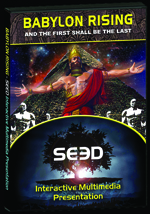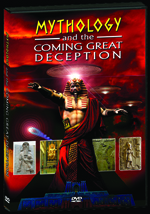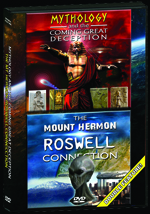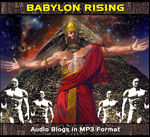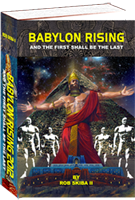The following information is taken from the e-book series:
BABYLON RISING: And The First Shall Be The Last
written by Rob Skiba II
Copyright © 2011
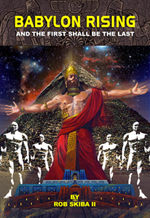 |
Nimrod, Abraham, the Pharaohs and Moses
|
Use the player to the left to listen as you read along! |
In my blogs, "The Man of Many Names" and "The First Shall Be The Last," we learned that Nimrod "began to become a [giant] mighty one" through some sort of defilement of himself. In the context of numerous other descriptions of this man, the word "gibbor" in this case was more than just a "mighty one" - Nimrod became a giant. Somehow, he activated Nephilim genes that apparently came to him through his ancestry. Thus, he became a Post-Flood member of the Demi-god Tier - an offspring of the Nephilim.
He built the Tower of Babel with intentions of killing God and taking over - a plan that was not at all unlike that of Zeus, the Olympian who sought to destroy the Titan gods who ruled before him. But Nimrod's plans were thwarted by God and the people of the earth who supported him were divided into 70 languages/nations. Each people group went away talking about the same guy, only now, he had other names. The dominant name he became known by was Osiris, the god of the Egyptians. Let's look a little deeper into this myth and how it played into the characters and events of our Hebrew Bible.
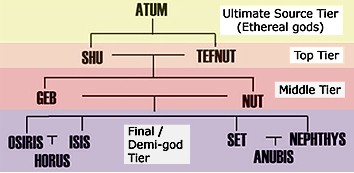 To the left is a typical diagram of the Egyptian god family tree.
To the left is a typical diagram of the Egyptian god family tree.
Here we see Atum as the Ultimate Source Tier god. Shu and Tefnut are the Top Tier gods, followed by Geb and Nut in the Middle Tier and Osiris is in the Final Tier (the same tier that we found Dionysus, Apollo, Marduk, Ninurta and Gilgamesh - all of which are other names for Nimrod). Similar to Marduk in the Sumerian family tree, Osiris rises from the Final Tier to be the ultimate, ruling diety in Egyptian mythology.
With this in mind, let's look at the Biblical Timeline of Human History Chart again. This time, we'll be focused on "days" 2 and 3, which covers the time of the Flood leading up to the time of King Solomon. This is the time period that really lays the foundation for understanding the Bible from a mythological worldview.
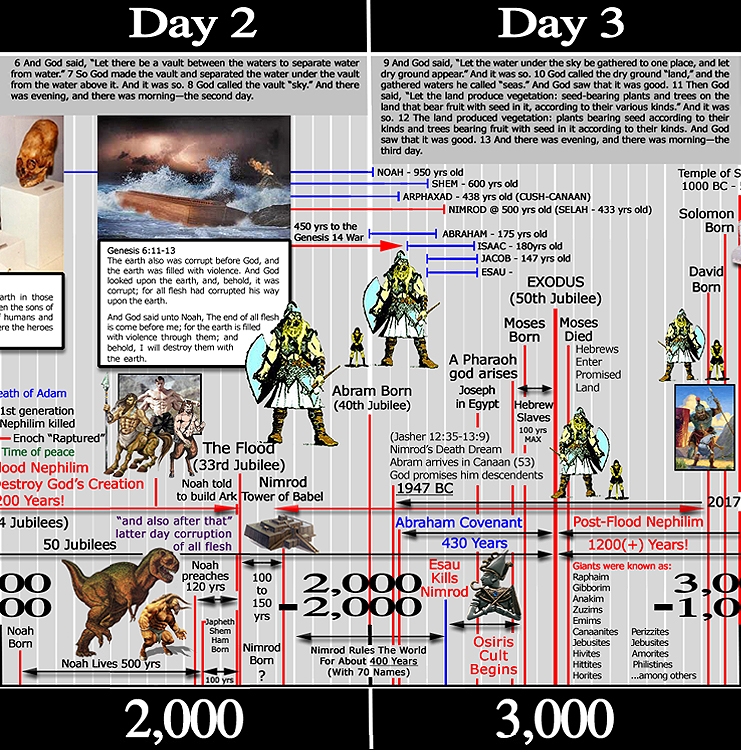
As you can see, there was a lot going on during that time period! But I want to draw your attention to the bottom-middle portion of this chart. We're going to camp out here for a while, because there is a ton of things to see and learn there.
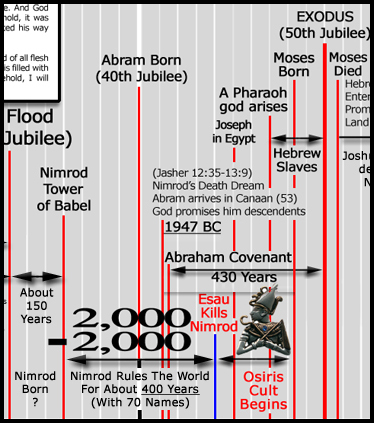 Notice, that Nimrod/Marduk/Osiris/Apollo was born/appeared sometime around a hundred years after the Flood of Noah. He built the Tower of Babel sometime after that, approximately 150 years after the Flood.
Notice, that Nimrod/Marduk/Osiris/Apollo was born/appeared sometime around a hundred years after the Flood of Noah. He built the Tower of Babel sometime after that, approximately 150 years after the Flood.
The Book of Jasher says that Nimrod became the first king of the world.
And Nimrod dwelt in Shinar, and he reigned securely, and he fought with his enemies and he subdued them, and he prospered in all his battles, and his kingdom became very great. And all nations and tongues heard of his fame, and they gathered themselves to him, and they bowed down to the earth, and they brought him offerings, and he became their lord and king, and they all dwelt with him in the city at Shinar, and Nimrod reigned in the earth over all the sons of Noah, and they were all under his power and counsel. And all the earth was of one tongue and words of union, but Nimrod did not go in the ways of the Lord, and he was more wicked than all the men that were before him, from the days of the flood until those days. - Book of Jasher 7:44-46 [emphasis mine]
Genesis also states this fact when it says that the whole world got behind Nimrod's grand idea of building a city and a great tower in the land of Shinar.
Now the whole earth used the same language and the same words. It came about as they journeyed east, that they found a plain in the land of Shinar and settled there. They said to one another, "Come, let us make bricks and burn them thoroughly." And they used brick for stone, and they used tar for mortar. They said, "Come, let us build for ourselves a city, and a tower whose top will reach into heaven, and let us make for ourselves a name, otherwise we will be scattered abroad over the face of the whole earth."
- Genesis 11:1-4 (NASB) [emphasis mine]
I believe the following image represents the shape the Tower of Babel most likely took - that of a large ziggurat. While massive in size, and still quite tall, the point wasn't its height in terms of distance from the ground. The point was that it could "reach into Heaven."
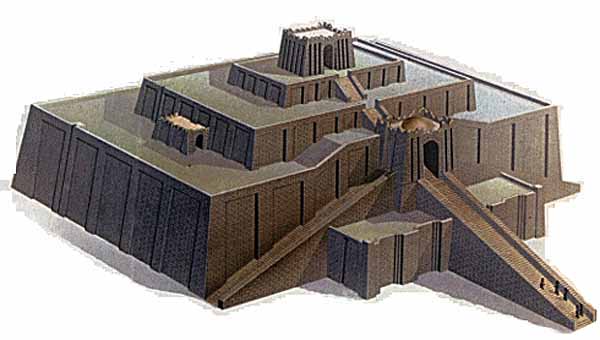
Whatever shape the Tower was, it seems that its functional intent - to "reach into Heaven" - was at least possible, otherwise God would not have responded the way He did. God put a stop to whatever was going on there and split the people up into 70 different language groups. These each became nations who all went away from that event talking about their king. Only now, he went by 70 different names! Though the people were divided in terms of their language, they were not divided in terms of their loyalty to the god-man-king they had been following. This is abundantly evident by the way the same man was referred to in ancient writings.
Consider how the newly formed Summerian people spoke of Marduk and Gilgamesh, or how the Greeks spoke of Apollo and how the Egyptians spoke of Osiris. His fame did not diminish. But as a result of the disturbance of their previously common language, over time the stories became embellished, distorted, modified and changed. This explains differences in the understanding of where this "mighty hunter" came from, who his parents were, etc.. But there are many common traits that remained in the telling and retelling of the stories of the first god-man-king of the world, and those are the details that lead us to believe we are talking about the same individual - the one the Bible calls Nimrod.
Now, I want to draw your attention to something else before we continue. Thinking back to just about any message you've ever heard preached concerning the Exodus, how long did every preacher or teacher you've ever heard say that the Jews were slaves in Egypt? Answer out loud then use your mouse to highlight the space below and read the next sentence.
400 years! < Left click here and drag your mouse to the left.
If you answered "four hundred years," then you have heard the same messages preached that I've heard my whole life. However, even without looking at the chart above, you would be hard pressed to find this fact in scripture. Yes, there are passages that reference this time period, but I believe our English translations (or at least our understanding of those particular scriptures) are in error. I say that because, the Bible itself proves that this idea of a 400 year period of slavery in Egypt is impossible.
Observe what Paul wrote in his letter to the Galations:
God gave the promises to Abraham and his child. And notice that the Scripture doesn’t say “to his children,” as if it meant many descendants. Rather, it says “to his child”—and that, of course, means Christ. This is what I am trying to say: The agreement God made with Abraham could not be canceled 430 years later when God gave the law to Moses. God would be breaking his promise. For if the inheritance could be received by keeping the law, then it would not be the result of accepting God’s promise. But God graciously gave it to Abraham as a promise.
- Galations 3:16-18 (NLT) [emphasis mine]
Paul just set the guard rails for understanding God's plan from Abraham to Moses (and ultimately to Messiah). He says that from the giving of the covenant (to Abraham) to the giving of the Law (to Moses) is 430 years. So, now go back to Genesis and see if you can find anywhere that the Hebrews were even in Egypt for 400 years between the time of Abraham and Moses. I double-dog-dare you! You won't find it.
No one was in Egypt for any extended period of time until Joseph was sold into slavery nearly 200 years after Abraham! Then, Jacob and his family came down from Canaan and were saved by Joseph sometime later. After that, all of the house of Jacob "lived the high-life" in the land of Goshen until a Pharaoh arose that did not know Joseph. Again, check it out for yourself. Here is a chart I created years ago, that visually illustrates this:
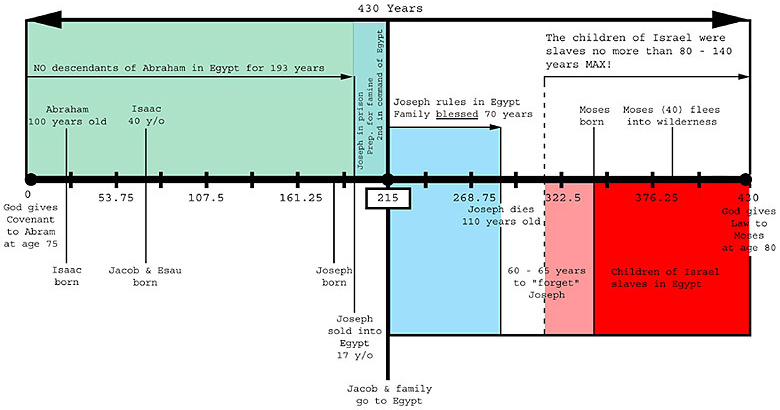
The best time frame for their slavery in Egypt that I can come up with (including the 80 years of Moses' life leading up to the Exodus) is about 140 to 150 years max - certainly not 400! So, where do we get this notion of a 400 year slavery?
And he said unto Abram, Know of a surety that thy seed shall be a stranger in a land that is not theirs, and shall serve them; and they shall afflict them four hundred years;
- Genesis 15:13 (KJV) [emphasis mine]
Notice there is NO mention of Egypt in that verse. The idea it is Egypt is an assumption made by scholars, pastors and teachers. The text itself does not say this is the case. It says a "land that is not theirs."
Note also what Stephen said when he was on trial in Acts:
So then he went forth from the land of the Chaldeans and settled in Haran. And from there, after his father died, [God] transferred him to this country [Israel - formerly called Canaan] in which you are now dwelling. Yet He gave him no inheritable property in it, [no] not even enough ground to set his foot on; but He promised that He would give it to Him for a permanent possession and to his descendants after him, even though [as yet] he had no child. And this is [in effect] what God told him: That his descendants would be aliens (strangers) in a land belonging to other people, who would bring them into bondage and ill-treat them 400 years. But I will judge the nation to whom they will be slaves, said God, and after that they will escape and come forth and worship Me in this [very] place.
- Acts 7:4-7 (Ampified Bible) [emphasis mine]
 So, even Stephen doesn't mention the nation of Egypt here by name. He says that God brought Abram out of the land of the Chaldeans and took him to Canaan. BUT God did not give him that land. This means it (Canaan-Israel) was still a "land belonging to other people." Then, Stephen goes on to tell his version of Genesis 15, where he states that Abram's descendants would be strangers in other people's land and that they (who? the people of the land where they are strangers - Canaan) would bring them into bondage.
So, even Stephen doesn't mention the nation of Egypt here by name. He says that God brought Abram out of the land of the Chaldeans and took him to Canaan. BUT God did not give him that land. This means it (Canaan-Israel) was still a "land belonging to other people." Then, Stephen goes on to tell his version of Genesis 15, where he states that Abram's descendants would be strangers in other people's land and that they (who? the people of the land where they are strangers - Canaan) would bring them into bondage.
This brings me to another common misconception, wrongly taught in church - the account of Joseph being sold into slavery. Most people think his brothers sold him into slavery. But that's not what the text says!
And it came to pass, when Joseph was come unto his brethren, that they stript Joseph out of his coat, his coat of many colours that was on him; And they took him, and cast him into a pit: and the pit was empty, there was no water in it.
And they sat down to eat bread: and they lifted up their eyes and looked, and, behold, a company of Ishmeelites came from Gilead with their camels bearing spicery and balm and myrrh, going to carry it down to Egypt. And Judah said unto his brethren, What profit is it if we slay our brother, and conceal his blood? Come, and let us sell him to the Ishmeelites, and let not our hand be upon him; for he is our brother and our flesh. And his brethren were content.
Then there passed by Midianites merchantmen; and they drew and lifted up Joseph out of the pit, and sold Joseph to the Ishmeelites for twenty pieces of silver: and they brought Joseph into Egypt.
And Reuben returned unto the pit; and, behold, Joseph was not in the pit; and he rent his clothes. And he returned unto his brethren, and said, The child is not; and I, whither shall I go? And they took Joseph's coat, and killed a kid of the goats, and dipped the coat in the blood; And they sent the coat of many colours, and they brought it to their father; and said, This have we found: know now whether it be thy son's coat or no. And he knew it, and said, It is my son's coat; an evil beast hath devoured him; Joseph is without doubt rent in pieces. And Jacob rent his clothes, and put sackcloth upon his loins, and mourned for his son many days. And all his sons and all his daughters rose up to comfort him; but he refused to be comforted; and he said, For I will go down into the grave unto my son mourning. Thus his father wept for him.
And the Midianites sold him into Egypt unto Potiphar, an officer of Pharaoh's, and captain of the guard.
- Genesis 37:23-36 (KJV) [emphasis mine]
Did you see it? Joseph's brothers put him in the pit. They left him there and went somewhere else to eat. From where ever they were, they looked up and saw a band of Ishmaelite traders and that's when Judah came up with the idea to sell Joseph to their cousins (the sons of Ishmael). The other brothers thought that was a good idea, so Reuben returned to the pit to get Joseph, but found that he was already gone! Where did he go? He was taken by the Midianites! And thus, we see that it was the Midianites that sold Joseph to the Ishmaelites first and later into the hands of Potiphar in Egypt.
The relationship between the Midianites and the Ishmaelites is uncertain here. It appears that the Midianites sold Joseph to the Ishaelites and then sold him (again) to the Egyptians. So, maybe the Ishmaelites realized Joseph was a cousin and sold him back? Or maybe the Ishmaelites sold him to some other Midianites who sold him to Potiphar? I don't know but apparently both groups of people were headed for Egypt. The bottom line is that it was the people of the land that Abram did not own who were the ones who started the process of Hebrew bondage and being "ill-treated." This happened about 200 years after God made His covenant with Abram.
Note also that the period of 430 years is actually mentioned a few times in Scripture:
- Genesis 11:17
And after he became the father of Peleg, Eber lived 430 years and had other sons and daughters.
- Exodus 12:40
Now the length of time the Israelite people lived in Egypt was 430 years.
- Exodus 12:41
At the end of the 430 years, to the very day, all the LORD’s divisions left Egypt.
- Galatians 3:17
What I mean is this: The law, introduced 430 years later, does not set aside the covenant previously established by God and thus do away with the promise.
 So, what's going on here??? I believe the answer is staring us right in the face! Let's look at the chart again and go back just a little bit further in time. Look at Genesis 11:17 again. It tells us that Eber lived 430 years after he became the father of Peleg. So what? Check out Genesis 10:25:
So, what's going on here??? I believe the answer is staring us right in the face! Let's look at the chart again and go back just a little bit further in time. Look at Genesis 11:17 again. It tells us that Eber lived 430 years after he became the father of Peleg. So what? Check out Genesis 10:25:
To Eber were born two sons: the name of one was Peleg [division], because [the inhabitants of] the earth were divided up in his days; and his brother's name was Joktan. - (Amplified Bible) [emphasis mine]
Ha! The Bible just gave you a big clue as to what's going on here. Eber is the man whose name is that from which we get the term "Hebrew." Eber had a son named Peleg - so named because it was in his days that the earth had been divided (at the Tower of Babel). After Eber had Peleg, he lived 430 years. What happened in those 430 years? Nimrod ruled as king of the world! In Egypt, he was known as Osiris. As we have already seen, Osiris was known as the King of kings and Lord of lords! So, what we see here is a king over the whole world, who eventually left his first capital (in Babylon) and set up his new headquarters in Egypt! So, in essence, what we have in the Exodus scriptures is an accurate statement by the time God says that to Abram. Now, let's see how this played out.
 My friend LA Marzulli is (at the time of this writing) currently working on a new book called, "The Cosmic Chess Match" which deals with the moves and counter-moves between God and Lucifer. I have often thought about the same thing when looking at history, current events and prophecy. You can see these constant movements on the "Chess Board of Life" being played out. But I have never seen the moves and counter moves so well played out, than at the beginning of the "new game" that appears to have started shortly after the Flood of Noah.
My friend LA Marzulli is (at the time of this writing) currently working on a new book called, "The Cosmic Chess Match" which deals with the moves and counter-moves between God and Lucifer. I have often thought about the same thing when looking at history, current events and prophecy. You can see these constant movements on the "Chess Board of Life" being played out. But I have never seen the moves and counter moves so well played out, than at the beginning of the "new game" that appears to have started shortly after the Flood of Noah.
The first game played out pretty quick. God makes man in His own image and they have a great relationship together. Lucifer gets jealous and tries to break up the relationship. Because of that, God pronounces a prophetic judgement, stating that Eve's seed will crush his head. Lucifer then tries to mess up the seed in order to subvert this judgement. He nearly succeeds, but God finds ONE family that is still pure enough to preserve the promised Seed. He saves Noah and his family and wipes out the world and all of the Devil's offspring in the Flood. Game over.
New game. The Devil doesn't waste any time. Within a hundred years after the Flood, he has a new champion player on the board. Nimrod. God lets the game play out a bit. Just as it looks like Lucifer may have a winning angle lining up, God makes a masterful move and confounds the languages. Nimrod is down but not out. The Devil still has his power-player in hand. God allows him to move this player into position again.
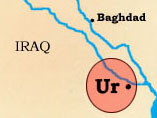 Then, God introduces his own new key player. Abram. By the time Abram was born, Nimrod was still in the land of Shinar. In fact, that was a big part of the reason why God called Abram out of Ur of the Chaldees (which was just south of Babylon) in the first place. And this is where "the game" starts to get really interesting.
Then, God introduces his own new key player. Abram. By the time Abram was born, Nimrod was still in the land of Shinar. In fact, that was a big part of the reason why God called Abram out of Ur of the Chaldees (which was just south of Babylon) in the first place. And this is where "the game" starts to get really interesting.
The Book of Jasher lays it out beautifully. Chapter 12 starts off with a very similar tale to that of Shadrach, Meshach, and Abednego , the three Hebrew slaves that - in the same place - King Nebuchadnezzar would throw into a firery furnace hundreds of years later. In this case, the king is Nimrod and it is Abram who has been found guilty and thrown into and yet preserved by God in the furnace. For the sake of brevity, let's pick up the story after that event. I'm going to include quite a bit of the text here because it is loaded with information!
(Note: this is the "event" I mentioned briefly - toward the end of the previous blog - that happened to Abram when he was 50 years old)
And the king [Nimrod] said to Abram, "How is it that thou wast not burned in the fire?"And Abram said to the king, "The God of heaven and earth in whom I trust and who has all in his power, he delivered me from the fire into which thou didst cast me."
And Haran the brother of Abram was burned to ashes, and they sought for his body, and they found it consumed. And Haran was eighty-two years old when he died in the fire of Casdim. And the king, princes, and inhabitants of the land, seeing that Abram was delivered from the fire, they came and bowed down to Abram. And Abram said to them, "Do not bow down to me, but bow down to the God of the world who made you, and serve him, and go in his ways for it is he who delivered me from out of this fire, and it is he who created the souls and spirits of all men, and formed man in his mother's womb, and brought him forth into the world, and it is he who will deliver those who trust in him from all pain."
And this thing seemed very wonderful in the eyes of the king and princes, that Abram was saved from the fire and that Haran was burned; and the king gave Abram many presents and he gave him his two head servants from the king's house; the name of one was Oni and the name of the other was Eliezer. And all the kings, princes and servants gave Abram many gifts of silver and gold and pearl, and the king and his princes sent him away, and he went in peace. And Abram went forth from the king in peace, and many of the king's servants followed him, and about three hundred men joined him. And Abram returned on that day and went to his father's house, he and the men that followed him, and Abram served the Lord his God all the days of his life, and he walked in his ways and followed his law. And from that day forward Abram inclined the hearts of the sons of men to serve the Lord.
And at that time Nahor and Abram took unto themselves wives, the daughters of their brother Haran; the wife of Nahor was Milca and the name of Abram's wife was Sarai. And Sarai, wife of Abram, was barren; she had no offspring in those days.
And at the expiration of two years from Abram's going out of the fire, that is in the fifty-second year of his life, behold king Nimrod sat in Babel upon the throne, and the king fell asleep and dreamed that he was standing with his troops and hosts in a valley opposite the king's furnace. And he lifted up his eyes and saw a man in the likeness of Abram coming forth from the furnace, and that he came and stood before the king with his drawn sword, and then sprang to the king with his sword, when the king fled from the man, for he was afraid; and while he was running, the man threw an egg upon the king's head, and the egg became a great river. And the king dreamed that all his troops sank in that river and died, and the king took flight with three men who were before him and he escaped. And the king looked at these men and they were clothed in princely dresses as the garments of kings, and had the appearance and majesty of kings. And while they were running, the river again turned to an egg before the king, and there came forth from the egg a young bird which came before the king, and flew at his head and plucked out the king's eye. And the king was grieved at the sight, and he awoke out of his sleep and his spirit was agitated; and he felt a great terror.
And in the morning the king rose from his couch in fear, and he ordered all the wise men and magicians to come before him, when the king related his dream to them. And a wise servant of the king, whose name was Anuki, answered the king, saying, "This is nothing else but the evil of Abram and his seed which will spring up against my Lord and king in the latter days. And behold the day will come when Abram and his seed and the children of his household will war with my king, and they will smite all the king's hosts and his troops. And as to what thou hast said concerning three men which thou didst see like unto thyself, and which did escape, this means that only thou wilt escape with three kings from the kings of the earth who will be with thee in battle. And that which thou sawest of the river which turned to an egg as at first, and the young bird plucking out thine eye, this means nothing else but the seed of Abram which will slay the king in latter days.
This is my king's dream, and this is its interpretation, and the dream is true, and the interpretation which thy servant has given thee is right. Now therefore my king, surely thou knowest that it is now fifty-two years since thy sages saw this at the birth of Abram, and if my king will suffer Abram to live in the earth it will be to the injury of my lord and king, for all the days that Abram liveth neither thou nor thy kingdom will be established, for this was known formerly at his birth; and why will not my king slay him, that his evil may be kept from thee in latter days?" And Nimrod hearkened to the voice of Anuki, and he sent some of his servants in secret to go and seize Abram, and bring him before the king to suffer death.
And Eliezer, Abram's servant whom the king had given him, was at that time in the presence of the king, and he heard what Anuki had advised the king, and what the king had said to cause Abram's death. And Eliezer said to Abram, Hasten, rise up and save thy soul, that thou mayest not die through the hands of the king, for thus did he see in a dream concerning thee, and thus did Anuki interpret it, and thus also did Anuki advise the king concerning thee.
And Abram hearkened to the voice of Eliezer, and Abram hastened and ran for safety to the house of Noah and his son Shem, and he concealed himself there and found a place of safety; and the king's servants came to Abram's house to seek him, but they could not find him, and they searched through out the country and he was not to be found, and they went and searched in every direction and he was not to be met with. And when the king's servants could not find Abram they returned to the king, but the king's anger against Abram was stilled, as they did not find him, and the king drove from his mind this matter concerning Abram.
And Abram was concealed in Noah's house for one month, until the king had forgotten this matter, but Abram was still afraid of the king; and Terah came to see Abram his son secretly in the house of Noah, and Terah was very great in the eyes of the king. And Abram said to his father, "Dost thou not know that the king thinketh to slay me, and to annihilate my name from the earth by the advice of his wicked counsellors? Now whom hast thou here and what hast thou in this land? Arise, let us go together to the land of Canaan, that we may be delivered from his hand, lest thou perish also through him in the latter days. Dost thou not know or hast thou not heard, that it is not through love that Nimrod giveth thee all this honor, but it is only for his benefit that he bestoweth all this good upon thee? And if he do unto thee greater good than this, surely these are only vanities of the world, for wealth and riches cannot avail in the day of wrath and anger. Now therefore hearken to my voice, and let us arise and go to the land of Canaan, out of the reach of injury from Nimrod; and serve thou the Lord who created thee in the earth and it will be well with thee; and cast away all the vain things which thou pursuest."
And Abram ceased to speak, when Noah and his son Shem answered Terah, saying, "True is the word which Abram hath said unto thee."
And Terah hearkened to the voice of his son Abram, and Terah did all that Abram said, for this was from the Lord, that the king should not cause Abram's death.
- Book of Jasher 12:34-62 [emphasis mine]
Like I said, that one chapter alone is loaded with information. It shows how Haran died before his father Terah. In fact it totally elaborates on Genesis 11:28-32, giving us a lot more details about the whole affair as to why Abram was "called out of Ur of the Chaldees" in the first place. It also helps to explain the myth of Osiris as it relates to Nimrod.
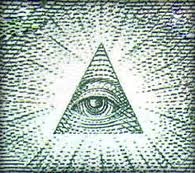 For instance, we are all familiar with the "All Seeing Eye." But few understand where this whole idea came from. At some point, either before or after Nimrod's death, it would
For instance, we are all familiar with the "All Seeing Eye." But few understand where this whole idea came from. At some point, either before or after Nimrod's death, it would 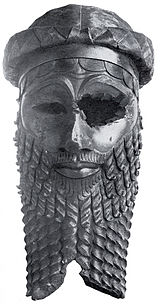 seem that he lost an eye. Anuki, the servant that interpretted Nimrod's dream (and possibly the author of the tales of the Anunnaki?), said that part of the dream means "nothing else but the seed of Abram will slay the king in latter days." [Jasher chapter 27 tells how Esau (Abraham's grandson) fulfills this prophecy.] Thus, I see Anuki's interpretaion as symbolic of two things:
seem that he lost an eye. Anuki, the servant that interpretted Nimrod's dream (and possibly the author of the tales of the Anunnaki?), said that part of the dream means "nothing else but the seed of Abram will slay the king in latter days." [Jasher chapter 27 tells how Esau (Abraham's grandson) fulfills this prophecy.] Thus, I see Anuki's interpretaion as symbolic of two things:
1) Nimrod's first death in the days to come (from that time).
2) Nimrod's coming second death in the latter days - those we call the Last Days.
Remember what I wrote concerning Sargon (pictured right) from the last blog? I told you to keep his image in mind, because true to Nimrod's dream, he is now missing an eye! So, if the losing of the eye represents his death, we can now clearly "see" the other symbolic reference here.
Through the cult of Osiris, the "All Seeing - remaining - Eye" seems to indicate a return. This is further confirmed by the numerous tales and iconography associated with Osiris - such as the Ankh and the Phoenix - both of which refer to resurrection. Again, Anuki said this would happen, "...in the latter days." Two eyes, two deaths! So, this seems to confirm our thesis concerning who the End Time Anti-Christ is. He is the one who "was, is not and yet shall be" - the first of the seven heads of the Beast John described in Revelation 17.
 OK. We've focused a lot on Nimrod so far, but I want to show you what God is doing here at the same time. Look at the chart again. Abram shows up on God's 40th Jubilee. Something else I find noteworthy going back to Jasher chapter 12, is where it says Nimrod's dream happened two years after Abram was dilevered from the firey furnace - when he was 52 years old. In numerical terms, 5+2=7, which is God's number, the number of completion and the numer of rest. Abram receives word from his servant Eliezer about what Anuki had told the king concerning this prophetic dream and Abram takes off for Noah and Shem's house! He remains there in safety and rest for a period of time while Nimrod's men look for him. The verbage used here, "let us go to the land Canaan..." seems to imply that Noah and Shem were also living somewhere in the area of Shinar at this time (which would seem to support the idea that the whole world went to Shinar as already noted above). As things began to heat up with Nimrod, apparently, Noah and Shem decided to "get out of Dodge-Shinar" too.
OK. We've focused a lot on Nimrod so far, but I want to show you what God is doing here at the same time. Look at the chart again. Abram shows up on God's 40th Jubilee. Something else I find noteworthy going back to Jasher chapter 12, is where it says Nimrod's dream happened two years after Abram was dilevered from the firey furnace - when he was 52 years old. In numerical terms, 5+2=7, which is God's number, the number of completion and the numer of rest. Abram receives word from his servant Eliezer about what Anuki had told the king concerning this prophetic dream and Abram takes off for Noah and Shem's house! He remains there in safety and rest for a period of time while Nimrod's men look for him. The verbage used here, "let us go to the land Canaan..." seems to imply that Noah and Shem were also living somewhere in the area of Shinar at this time (which would seem to support the idea that the whole world went to Shinar as already noted above). As things began to heat up with Nimrod, apparently, Noah and Shem decided to "get out of Dodge-Shinar" too.
A year later, when Abram is 53 (5+3=8 - a new beginning), he is told by God that he will have many descendents. This was the beginning of the promise! Now, here's the amazing part... that happened in 1947 BC!
In 1947 AD, the United Nations signed the decree that would ultimately lead to the forming of Israel as a nation again the following year. Now, I understand that those dates are based on the Gregorian calendar and not the Hebrew, but to me that just makes it all that much more amazing! Though man sought to distort times, seasons, years and dates, they still harmonize to show God's incredible plan. Only God could do that!
At first, Bible students may see the Jasher account as contradicting Genesis 12:4, which states that Abram was 75 when he left Haran. It is not a contradiction. Jasher simply gives you more detail than Genesis does. Genesis 11 tells us that Abram left Ur, apparently with intentions of going to Canaan, but they instead settled in Haran.
Terah took his son Abram, his grandson Lot son of Haran, and his daughter-in-law Sarai, the wife of his son Abram, and together they set out from Ur of the Chaldeans to go to Canaan. But when they came to Haran, they settled there. Terah lived 205 years, and he died in Harran.
- Genesis 11:31-32 (NIV) [emphasis mine]
Verse 32 leads us to believe that they stayed in Haran until Abram's father Terah died. But that's not what the text says. It just says they settled in Herran and then it tells you how long Terah lived. Genesis chapter 12 starts off with them leaving Haran to settle in Canaan and then reveals Abram's age to be 75. Jasher fills in some gaps in the story.
Apparenlty, the firery furnace event happened when Abram was 50. The dream of Nimrod happened two years later. Abram went into hiding at age 52, then had a discussion with his dad about leaving. They left for Canaan, but stayed in Haran for three years instead. It was during that time that God told Abram that He would greatly bless him if he kept His commandments. This happened when Abram was 53 in the year 1947BC. By age 55 (after living in Haran for 3 years), God told Abram to go to Canaan. Abram obeys. Then in chapter 13, we learn that Noah dies and that Abram was 58 years old when that happens.
At that time, at the end of three years of Abram's dwelling in the land of Canaan, in that year Noah died, which was the fifty-eighth year of the life of Abram; and all the days that Noah lived were nine hundred and fifty years and he died. And Abram dwelt in the land of Canaan, he, his wife, and all belonging to him, and all those that accompanied him, together with those that joined him from the people of the land; but Nahor, Abram's brother, and Terah his father, and Lot the son of Haran and all belonging to them dwelt in Haran.
- Jasher 13:9-10
So Abram and Sarai stayed in Canaan, but Nahor, Terah and Lot stayed in Haran. Eventually, after a number of years, war and other circumstances cause Abram to move back to Haran to see his family. But God appears to him again and tells him to get back to Canaan.
In those days the Lord appeared to Abram in Haran, and he said to him, Behold, I spoke unto thee these twenty years back saying, "Go forth from thy land, from thy birth-place and from thy father's house, to the land which I have shown thee to give it to thee and to thy children, for there in that land will I bless thee, and make thee a great nation, and make thy name great, and in thee shall the families of the earth be blessed. Now therefore arise, go forth from this place, thou, thy wife, and all belonging to thee, also every one born in thy house and all the souls thou hast made in Haran, and bring them out with thee from here, and rise to return to the land of Canaan."
And Abram arose and took his wife Sarai and all belonging to him and all that were born to him in his house and the souls which they had made in Haran, and they came out to go to the land of Canaan.
And Abram went and returned to the land of Canaan, according to the word of the Lord. And Lot the son of his brother Haran went with him, and Abram was seventy-five years old when he went forth from Haran to return to the land of Canaan.
- Jasher 13:22-26 [emphasis mine]
Thus, the Jasher account is reconciled with the record of Genesis. I am including all of this to show that books like Jasher have tremendous value. We're not going to hang any doctrine on them, but they are still useful in helping us to fill in historical gaps in order to gain a greater understanding of some of the times, events and people of the Bible.
Meanwhile, during those twenty years or so that Abram was bouncing back and forth between Haran and Canaan, Nimrod was also doing some traveling of his own. Though Nimrod still reigned from the area of Babylon, he regularly made trips to other parts of his kingdom. Apparently, one of his favorite spots was Egypt - the land from which he would eventually rule the ancient world - even after his death.
Chapter 14 of Jasher introduces a very intriguing character named Rikayon, a man who would eventually become the first Pharaoh - a governing prefect under Osiris (spelled Oswiris in Jasher). The way this man achieves such status is very interesting. Essentially, he took it upon himself to extract a tax from the people before they were allowed to bury their dead. The people freaked out. Then, at the appointed time, when the king (Nimrod - known to the Epyptians as Oswiris) came to town, the people presented their grievences to him concerning this. But Rikayon had made so much money that he came to the king with lavish gifts, thus earning his favor.
And the king answered and said to Rikayon, Thy name shall no more be called Rikayon but Pharaoh shall be thy name, since thou didst exact a tax from the dead; and he called his name Pharaoh. And the king and his subjects loved Rikayon for his wisdom, and they consulted with all the inhabitants of Egypt to make him prefect under the king. And all the inhabitants of Egypt and its wise men did so, and it was made a law in Egypt. And they made Rikayon Pharaoh prefect under Oswiris king of Egypt, and Rikayon Pharaoh governed over Egypt, daily administering justice to the whole city, but Oswiris the king would judge the people of the land one day in the year, when he went out to make his appearance.
And Rikayon Pharaoh cunningly usurped the government of Egypt, and he exacted a tax from all the inhabitants of Egypt. And all the inhabitants of Egypt greatly loved Rikayon Pharaoh, and they made a decree to call every king that should reign over them and their seed in Egypt, Pharaoh. Therefore all the kings that reigned in Egypt from that time forward were called Pharaoh unto this day.
- Jasher 14:27-33 [emphasis mine]
Isn't interesting that Nimrod becomes so impressed with Rikayon's ability to extract a "death tax" that he elevates him to a position of leadership and changes his name to Pharaoh! That should give us an indication of how the Pharaohs will rule and view things from that point on. But this also establishes the direct link between King Nimrod and the Pharaohs.
Now, let's get back to the issue of the 400 years mentioned in Genesis 15. We all know Rome is in Italy. Yet the ROMAN EMPIRE covered a vastly larger portion of the Earth (including the land of Shinar - Babylon).
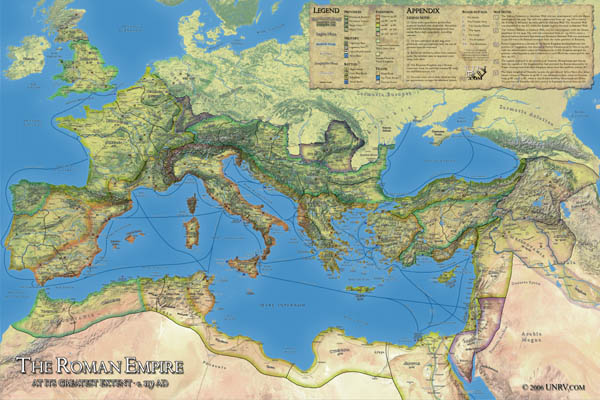
If you lived in a country that had been swallowed up by this empire, you lived in Rome! You were a "slave to Rome." You had to do what the Romans did. You had to obey their laws, adopt their language and customs, worship their gods or suffer their consequences. Thus, I believe in like manner, this is similar to the termonology being used at the time of God's conversation with Abram in Genesis 15 (concerning Egypt - and the kingdom of Nimrod).
And he said unto Abram, Know of a surety that thy seed shall be a stranger in a land that is not theirs, and shall serve them; and they shall afflict them four hundred years;
- Genesis 15:13 (KJV) [emphasis mine]
The whole world was a "slave to Egypt" in the sense that they were all under the rulership of Osiris-Nimrod and as we will soon see as this game progresses... his pharaohs. I could camp out here for quite a while and talk about Abram's interactions with Pharaoh in Egypt and the wars that involved Nimrod, but for the sake of brevity, let's jump ahead - back to the time of Joseph. I just wanted to addess the complete misunderstanding most Bible teachers appear to have concerning the issue of the Hebrew slavery in Egypt. I hope this is starting to make more sense now?
So, Egypt starts to become very wealthy and Nimrod-Osiris becomes quite impressed with this new Pharaoh concept. But he has a vast kingdom to run. And so, he continues to do his thing. But eventually, the time comes when Nimrod's prophetic dream is about to be proven true.
By now, Abram's name has been changed. He had the promised son, Isaac. Isaac has two children, Esau and Jacob. Esau becomes a great hunter. And now, the game begins to pick up pace again.
One day, Nimrod decided to encroach on Esau's territory. It's the classic "alpha dog" syndrome. Nimrod saw this other hunter rising in fame and thus became jealous of him - probably on account of his youth. We have to realize that by this time, Nimrod is upwards of 500 years old and slowing down. But Esau is a young man in his prime. The writing is on the wall. This is how it goes down.
And Esau at that time, after the death of Abraham, frequently went in the field to hunt.
And Nimrod king of Babel, the same was Amraphel, also frequently went with his mighty men to hunt in the field, and to walk about with his men in the cool of the day. And Nimrod was observing Esau all the days, for a jealousy was formed in the heart of Nimrod against Esau all the days.
And on a certain day Esau went in the field to hunt, and he found Nimrod walking in the wilderness with his two men. And all his mighty men and his people were with him in the wilderness, but they removed at a distance from him, and they went from him in different directions to hunt, and Esau concealed himself for Nimrod, and he lurked for him in the wilderness. And Nimrod and his men that were with him did not know him, and Nimrod and his men frequently walked about in the field at the cool of the day, and to know where his men were hunting in the field. And Nimrod and two of his men that were with him came to the place where they were, when Esau started suddenly from his lurking place, and drew his sword, and hastened and ran to Nimrod and cut off his head.
And Esau fought a desperate fight with the two men that were with Nimrod, and when they called out to him, Esau turned to them and smote them to death with his sword.
And all the mighty men of Nimrod, who had left him to go to the wilderness, heard the cry at a distance, and they knew the voices of those two men, and they ran to know the cause of it, when they found their king and the two men that were with him lying dead in the wilderness.
And when Esau saw the mighty men of Nimrod coming at a distance, he fled, and thereby escaped; and Esau took the valuable garments of Nimrod, which Nimrod's father had bequeathed to Nimrod, and with which Nimrod prevailed over the whole land, and he ran and concealed them in his house.
And Esau took those garments and ran into the city on account of Nimrod's men, and he came unto his father's house wearied and exhausted from fight, and he was ready to die through grief when he approached his brother Jacob and sat before him.
- Jasher 27:1-11
Again, there's a lot going on here. If reading this blog is presenting you with your first exposure to the Book of Jasher, this story will fill in some more "Bible gaps" for you and Genesis 25 is about to make a whole lot more sense!
The boys grew up, and Esau became a skillful hunter, a man of the open country, while Jacob was content to stay at home among the tents. Isaac, who had a taste for wild game, loved Esau, but Rebekah loved Jacob.
Once when Jacob was cooking some stew, Esau came in from the open country, famished. He said to Jacob, “Quick, let me have some of that red stew! I’m famished!” (That is why he was also called Edom.)
Jacob replied, “First sell me your birthright.”
“Look, I am about to die,” Esau said. “What good is the birthright to me?”
But Jacob said, “Swear to me first.” So he swore an oath to him, selling his birthright to Jacob.
Then Jacob gave Esau some bread and some lentil stew. He ate and drank, and then got up and left. So Esau despised his birthright.
- Genesis 25:27-34 (NIV) [emphasis mine]
In the context of the Jasher account, that story makes a whole lot more now sense doesn't it? I mean think about it. Without Jasher, the story in Genesis 25 makes no sense at all. Verse 27 says that Esau was a skilled hunter. Isaac loved the wild game Esau was apparently good at killing and bringing home for his father. So, why is it that this great hunter comes home from a day of hunting and sells his birthright for a bowl of beans?? After reading Jasher, you now completely understand what is going on and why. Esau had just killed the king of the world!
 By the way, the "valuable garments" that Nimrod had, "with which he prevailed over the whole land" were the original garments God made for Adam and Eve back in the garden. But that's another (cool) story in itself. Anyway, so here Esau has chopped off Nimrod's head and stolen his "magic garments." The rest of Nimrod's "mighty men" were after him now. Esau came home famished from a very busy day! So, when Jacob says he wants his birthright, Esau basically said, "Look. What do I care about my birthright? I just killed King Nimrod! I'm a dead man. His warriors are probably coming for me as we speak. Just give me something to eat!" Esau was extremely vulnerable here and Jacob totally took advantage of the situation for his own selfish gain.
By the way, the "valuable garments" that Nimrod had, "with which he prevailed over the whole land" were the original garments God made for Adam and Eve back in the garden. But that's another (cool) story in itself. Anyway, so here Esau has chopped off Nimrod's head and stolen his "magic garments." The rest of Nimrod's "mighty men" were after him now. Esau came home famished from a very busy day! So, when Jacob says he wants his birthright, Esau basically said, "Look. What do I care about my birthright? I just killed King Nimrod! I'm a dead man. His warriors are probably coming for me as we speak. Just give me something to eat!" Esau was extremely vulnerable here and Jacob totally took advantage of the situation for his own selfish gain.
Now, let's look at the chart again. You will see that I have an image of Osiris there and the words, "Osiris Cult Begins." This happens in Egypt. So, let's leave the drama of Esau, Jacob and Isaac in Canaan and again go back there for a while.
I can imagine the Egyptians lamented, "The king of the world has just been killed! A tragedy. By a Canaanite boy? How embarrassing! Let's conjure up a more interesting, noble tale." Enter the Myth of Osiris.
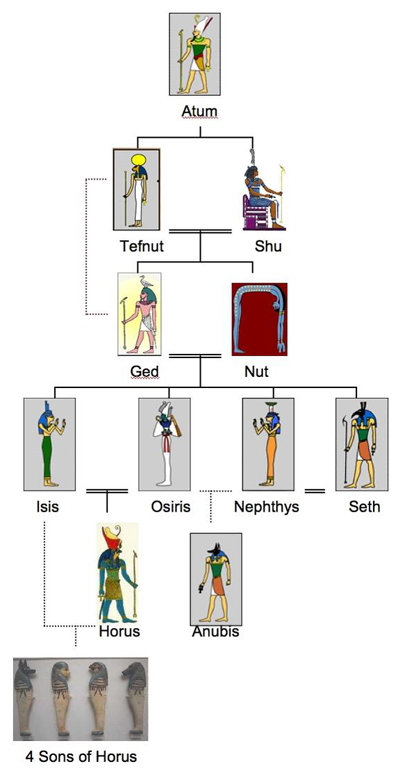 As with much of the ancient Egyptian mythology, there are various versions of the story, but basically it goes something like this:
As with much of the ancient Egyptian mythology, there are various versions of the story, but basically it goes something like this:
- The son of Geb and Nut, Osiris was an earthly ruler, who was very popular with his subjects.
- He was married to his sister, Isis.
- His brother, Set, was jealous of this popularity and plotted to kill him.
- Set's plans to be rid of his brother started when he secretly obtained his brothers measurements and had a magnificent casket made to fit. This casket was in the form of a human shaped box (which likely became the origin of the human shaped pharaoh caskets).
- Set then organized a large feast to which Osiris and a number of others (usually given as 72) were invited. At the height of the festivities, Set produced the casket and announced that it would be given to whomever it fit. All the guests tried it on for size, but none fit until finally Osiris stepped inside. Set immediately slammed the lid closed and sealed the casket shut (with molten lead). The sealed coffin was then thrown into the Nile and Osiris drowned.
- Isis was devastated at the loss of her husband and searched for the casket throughout Egypt and then overseas. She eventually eventually found it (in Byblos) where it had come to rest. A massive tree had grown over it.
- Finally, Isis returned Osiris' body to Egypt for a proper burial. For safe keeping she concealed the casket in the marshes beside the Nile.
- Set found the casket and his brother's body while out hunting and was so enraged that he chopped it into pieces, and scattered the parts throughout the land of Egypt. (this is probably the part that is actually based on the truth of Esau's "hunting" trip)
- Poor Isis had to then set out again looking for the parts of her husband. Eventually she found all of them except his penis (which was apparently swallowed up by either a crocodile or a fish). She "put Humpty Dumpty back together again" - reassembling Osiris (like Frankenstein) and then wrapped him in bandages - as the first mummy.
- Isis replaced the penis with a reasonable facsimile (an obelisk), and somehow became impregnated by the corpse of Osiris to later give birth to Horus. In some accounts Isis breathed life back into Osiris' body and it was then that Horus was conceived - which would be even more of a magical event, considering the one part she couldn't find.
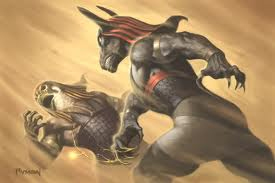 The young Horus then went out to battle his uncle Set and to avenge his fathers death. After a series of fights detailed in "The contendings of Horus and Set" neither god was able to secure an overall victory.
The young Horus then went out to battle his uncle Set and to avenge his fathers death. After a series of fights detailed in "The contendings of Horus and Set" neither god was able to secure an overall victory. - Ultimately Osiris was declared king of the underworld, Horus king of the living, and Set ruler of the deserts as the god of chaos and evil.
That's the basic story in a nut shell. For more, go to:
- http://www.philae.nu/philae/IsisOsiris.html
- http://en.wikipedia.org/wiki/Myth_of_Osiris_and_Isis
- http://www.touregypt.net/godsofegypt/legendofosiris.htm
Interesting, maybe even entertaining, but where is the truth in this? I believe the Jasher account to be the closest to the truth of anything I've read thus far. But I will leave you to decide for yourself what you think the truth is in this myth. In the meantime, let's look at the Egyptian gods family tree again:
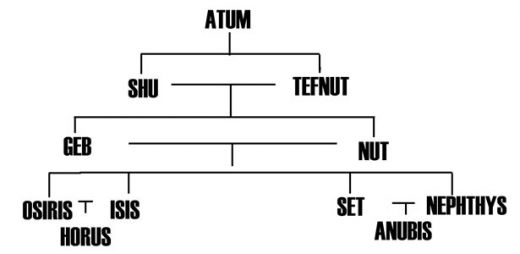
Wikipedia has this to say about Egyptian mythology:
Egyptian mythology established multiple groupings of deities, known as Pesedjets. The Pyramid Texts of the 5th and 6th dynasties mention the Great Pesedjet, the Lesser Pesedjet, the Dual Pesedjet, plural Pesedjets, and even the Seven Pesedjets. There is also what is called the Ennead. This is a Greek term denoting a group of nine (which is all of the above minus Horus and Anubis).
The creation account of Heliopolis relates that from the primeval waters represented by Nun, a mound appeared on which the self-begotten deity Atum sat. Bored and alone, Atum spat or, according to other stories, masturbated producing Shu, representing the air and Tefnut, representing moisture. Some versions however have Atum - identified with Ra - father Shu and Tefnut with Iusaaset, who is accordingly sometimes described as a "shadow" in this pesedjet.
In turn, Shu and Tefnut (air and moisture) mated and brought forth Geb, representing the earth, and Nut, representing the nighttime sky. Because of their initial closeness, Geb and Nut engaged in continuous copulation until Shu separated them, lifting Nut into her place in the sky. The children of Geb and Nut were the sons Osiris and Set and the daughters Isis and Nephthys, which in turn formed couples.
Unlike the Greek god family tree that I showed you in the first part of this series, here we see some very bizzare, and frankly rediculous concepts depicted. Everything up to the level of Osiris and Isis represents some sort of physical, personified representation of atmospheric and terrestial attributes of heaven and earth. As we saw in the last blog, the same holds true for the Summerian pantheon, which became adopted by the Babylonians. In their case, you don't really have gods that are truly depicted as individuals until you get to the level of Enlil, Enki and Marduk (who we have already established as a representation of Nimrod). Enlil appears to be their version of YHWH and Enki appears to be the equivalent to Lucifer. But although in both of these cases, it may be tempting to write them off as "mythology" and fanciful stories written by ancient cultures, I do not think it is wise to dismiss them altogether. To the ancients, these stories represented some form of reality.
 I believe the Bible holds the truth for all things. And I believe the books contained in the Bible were Divinely inspired. As such, I think it is worth looking at what God thinks about these other gods. The war against them starts in Egypt, but as we will see it goes well beyond just the Egyptians.
I believe the Bible holds the truth for all things. And I believe the books contained in the Bible were Divinely inspired. As such, I think it is worth looking at what God thinks about these other gods. The war against them starts in Egypt, but as we will see it goes well beyond just the Egyptians.
Going back to the Tower of Babel, we know that God confounded the languages, which separated the people. But each people group appears to have been assigned a (fallen?) angel as a god.
When the Most High assigned lands to the nations, when he divided up the human race, he established the boundaries of the peoples according to the number in his heavenly court.
- Deuteronomy 32:8 (NLT) [emphasis mine]
Most English translation render the last sentence as the "number of the children (or sons) of Israel" But the Dead Sea Scrolls read, "the number of the sons of God," and the Greek Septuagint version reads, "the number of the angels of God." I believe those represent the more accurate interpretation of the text, which makes the next verse that much more important. It says that God kept one group for Himself.
For the people of Israel belong to the Lord; Jacob is his special possession. He found them in a desert land, in an empty, howling wasteland. He surrounded them and watched over them; he guarded them as he would guard his own eyes.
- Deut. 32:9-10 (NLT) [emphasis mine]
I will again refer to something I wrote in "The Man of Many Names" blog:
In Barne's Notes on the Bible, the author writes,
The Book of Jasher confirms this idea as well. In chapter 48:43, it describes the throne of Pharaoh as follows.
The narrative goes on to describe the reasons for the seventy steps, stating that they represent the 70 languages of man. Note verses 45b-47:
In the next chapter (of Jasher), we see in the account of Joseph being made second in charge of Egypt, that Pharaoh's officers protested the idea of someone ruling over them who did not know all 70 languages. This would have presented a problem for Joseph if it were not for an angel of the Lord coming to him that night and teaching him all 70 languages (Jasher 49:9-18). |
In that blog and in the ones that followed, I steered your attention to pieces of the puzzle that concerned Nimrod. But I want to insert here something of the bigger picture. Look at what is happening. Nimrod sought to "reach into heaven" because he imagined he and his troops could actually assault God and His angels and take over.
And the building of the tower was unto them a transgression and a sin, and they began to build it, and whilst they were building against the Lord God of heaven, they imagined in their hearts to war against him and to ascend into heaven.
And all these people and all the families divided themselves in three parts; the first said We will ascend into heaven and fight against him; the second said, We will ascend to heaven and place our own gods there and serve them; and the third part said, We will ascend to heaven and smite him with bows and spears; and God knew all their works and all their evil thoughts, and he saw the city and the tower which they were building.
- Jasher 9:25-26 [emphasis mine]
What follows, explains the number of languages as being associated with angels:
And God said to the seventy angels who stood foremost before him, to those who were near to him, saying, Come let us descend and confuse their tongues, that one man shall not understand the language of his neighbor, and they did so unto them.
- Jasher 9:32 [emphasis mine]
What happens next is pretty amazing and very telling in regards to the issue of a group of gods I have not yet mentioned.
And the Lord smote the three divisions that were there, and he punished them according to their works and designs; those who said, We will ascend to heaven and serve our gods, became like apes and elephants; and those who said, We will smite the heaven with arrows, the Lord killed them, one man through the hand of his neighbor; and the third division of those who said, We will ascend to heaven and fight against him, the Lord scattered them throughout the earth.
- Jasher 9:35 [emphasis mine]
God rewarded each of the three camps accourding to the plans that they intended against Him. He killed those who thought to kill Him and scattered the third group throughout the earth (through the confounding of their languages). But notice what He did to the first group that intended to serve their own gods in Heaven. The Lord made them to become like apes and elephants! I believe this explains the millions of gods of the Hindu faith, specifically the two that are depicted as humans with animal heads - one of an ape, the other of an elephant!
Accourding to Wikipedia:
Ganesha is widely revered as the Remover of Obstacles[10] and more generally as Lord of Beginnings and Lord of Obstacles, patron of arts and sciences, and the deva of intellect and wisdom.[12] He is honoured at the beginning of rituals and ceremonies and invoked as Patron of Letters during writing sessions.[13] Several texts relate mythological anecdotes associated with his birth and exploits and explain his distinct iconography.
Ganesha emerged a distinct deity in clearly recognizable form in the 4th and 5th centuries CE, during the Gupta Period, although he inherited traits from Vedic and pre-Vedic precursors.[14] His popularity rose quickly, and he was formally included among the five primary deities of Smartism (a Hindu denomination) in the 9th century. A sect of devotees called the Ganapatya, who identified Ganesha as the supreme deity, arose during this period.[15] The principal scriptures dedicated to Ganesha are the Ganesha Purana, the Mudgala Purana, and the Ganapati Atharvashirsa. In his praise the Ganesha Chalisa is sung.
As for the "ape god-man" Hanuman, the mighty ape that aided Lord Rama in his expedition against evil forces, is one of the most popular idols in the Hindu pantheon.
Hanuman was believed to be an avatar of Lord Shiva, Hanuman is worshiped as a symbol of physical strength, perseverance and devotion.
Hanuman's tale in the epic Ramayana - where he is assigned the responsibility to locate Rama's wife Sita abducted by Ravana, the demon king of Lanka — is known for its astounding ability to inspire and equip a leader with all the ingredients needed to face ordeals and conquer obstructions in the way of the world.
Not surprising, this one apparently is a favorite of President Obama!
So, we see a LOT happened at the Tower of Babel! But getting back to Deuteronomy 32, we also see essentially the rules of this game. It's almost like God is saying to Lucifer, "OK. Here's the deal. You get 70 nations to rule over. I'll take just 1. So the odds are 70 to 1 in your favor. Give it your best shot!"
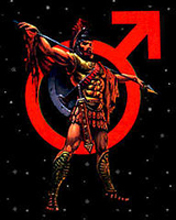 All sorts of gods and myths are developed in many nations from that point on. And in each and every one of the pantheons of gods that developed around the world, we can see different components of the Devil's war strategy. We can see where he experimented and where some ideas worked and some didn't. The ones that did work, he improved upon. The ones that didn't work, he kept, but did not seem to use - at least not in that part of the game that involved the Hebrews. Because when it came to God's Chosen Ones, Lucifer seems to have preferred to focus primarily on using the Sumerian, Egyptian and Greek myths as his primary weapons. And while we might think he's going to use each of these three in that order, it appears he is going to push the Egyptians out into the "lime light" first, while building a master plan for the Sumerians that will start out in the ancient past, but play a major role in the distant future. All the while, he will manifest himself into the Greek pantheon in order to draw worship directly to himself along the way.
All sorts of gods and myths are developed in many nations from that point on. And in each and every one of the pantheons of gods that developed around the world, we can see different components of the Devil's war strategy. We can see where he experimented and where some ideas worked and some didn't. The ones that did work, he improved upon. The ones that didn't work, he kept, but did not seem to use - at least not in that part of the game that involved the Hebrews. Because when it came to God's Chosen Ones, Lucifer seems to have preferred to focus primarily on using the Sumerian, Egyptian and Greek myths as his primary weapons. And while we might think he's going to use each of these three in that order, it appears he is going to push the Egyptians out into the "lime light" first, while building a master plan for the Sumerians that will start out in the ancient past, but play a major role in the distant future. All the while, he will manifest himself into the Greek pantheon in order to draw worship directly to himself along the way.
 We see the Egyptian players become very active shortly after the death of Osiris-Nimrod. A cult following develops quickly. But just as it is developing, God takes a seemingly insignificant piece out of his small bin of players and tosses him into the middle of the mix. A naive Hebrew boy named Joseph gets sold into slavery. But in the dungeons, God has a plan. Soon, Joseph rises to a position of power in the Egyptian empire.
We see the Egyptian players become very active shortly after the death of Osiris-Nimrod. A cult following develops quickly. But just as it is developing, God takes a seemingly insignificant piece out of his small bin of players and tosses him into the middle of the mix. A naive Hebrew boy named Joseph gets sold into slavery. But in the dungeons, God has a plan. Soon, Joseph rises to a position of power in the Egyptian empire.
Then comes the famine in the land of Canaan. And the beginning of the most beautiful story of redemption begins to play out. But notice the number of Jacob's household that goes down into Egypt.
And the sons of Joseph, who were born to him in Egypt, were two persons. All the persons of the house of Jacob [including Joseph and Jacob himself], who came into Egypt, were seventy. - Genesis 46:27 (Amplified) [emphasis mine]
How cool is that?? The Devil starts out with 70 nations. God chooses just 1 man (Abram) to be His representative. Then at about the half way mark of the 430 year plan, at the height of the development of a global empire, God sticks 70 of His chosen individuals into Egypt.[1]
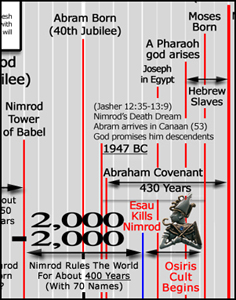 The drama plays out of the amazing reunion of Joseph and his father Jacob. The forgiveness of the sins of his brothers is modeled for us. Tears are shed. We smile and say, "Wow! What a beautiful story." But wait! There's more! So much more!
The drama plays out of the amazing reunion of Joseph and his father Jacob. The forgiveness of the sins of his brothers is modeled for us. Tears are shed. We smile and say, "Wow! What a beautiful story." But wait! There's more! So much more!
As stated above, no Hebrew was a slave in Egypt for 400 years. Eventually, Jacob dies, then Joseph (at 110 years of age) and finally the others do as well. We are now well past the mid point of Paul's 430 year guard rails from Abraham to Moses when a Pharaoh arises who "knew not Joseph." But this Pharaoh is different. This one actually thinks he is a god! How did that happen?
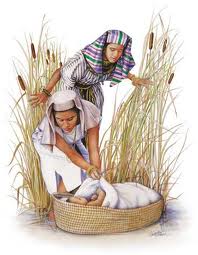 Remember, the newly formed cult of Osiris was quietly gaining momentum in the background while the Hebrew drama was playing out on the main stage. Suddenly the tables turn! The Devil moves his new god-man into the game. The oppression begins. The heat is on. God's people suffer.
Remember, the newly formed cult of Osiris was quietly gaining momentum in the background while the Hebrew drama was playing out on the main stage. Suddenly the tables turn! The Devil moves his new god-man into the game. The oppression begins. The heat is on. God's people suffer.
But then, God raises His own (future) champion. Moses! Perhaps in a mocking gesture, God puts Moses in a reed basket and floats it down the Nile, which preserves his life (unlike Osiris who - according to the now widely popular myth - took a similar trip in a casket that ended his life).
It is from this point forward, that God will wage an all out assault on the gods of this world. The story of the Exodus is about to come more alive for you than ever before. I can almost guarantee it!
To be continued.... in God vs god, Part 4: Building a Pure Nation >>
Were you blessed by this information? If so, please consider contributing toward our on-going research efforts. Of course, there is no pressure, but for those so inclined to give, your support is greatly appreciated. We are only able to do this sort of thing for free because of the faithful support of people like you. If you prefer not to donate on-line, please send contributions to: King's Gate Media Please note, we are NOT a 501c3, which means our message is not regulated by the government, |
If you have enjoyed reading this blog series, be sure to check out these other related products: |
|||||
|
The SUPER Collection |
Mythology and the Coming Great Deception |
The Mount Hermon |
Double Feature! Get both DVDs |
MP3 Files Blog Audio: Includes more than 15 hours of audio! |
MP3 Files Revolutionary Radio: Supernatural Collection Includes more than 15 hours of audio! |
| $50 | $20 | $20 | $35 | $20 | $20 |
-
This fact presents another way of looking at Deuteronomy 32:8. The New Living Translation states it as:
When the Most High assigned lands to the nations, when he divided up the human race, he established the boundaries of the peoples according to the number in his heavenly court. [emphasis mine]
In the Man of Many Names blog, I showed how some Bibles translate that last part as, " according to the number of the children of Israel." What is very interesting about that translation is the fact that there were 70 nations (and principalities that rule over them). Genesis 46:27 states that all of the sons of Jacob (Israel) that went down to Egypt numbered 70. And as we will see in the Exodus, those 70 grew in number and were instrumental in being used by God to topple the 70 principalities/gods of the world! In other words, there will come a time when all of the nations of the world will be ruled by the sons of Israel (which now, through Yeshua includes all Believers), ruling from Jerusalem in the coming Millennial Reign of Christ.
The information presented in this blog is part of the e-book series:
|
|||
This e-book series is designed to explore many of the themes, concepts and ideas that will be in our forthcoming sci-fi series SEED. Thus, you might think of it as the non-fiction behind the fiction. To navagate this series, use the slide-out BLOG MENU to the left. Keep in mind that this is a work in progress. As such, each blog (chapter) is subject to change, modification and in some cases a complete re-write as I receive feedback, criticism and new revelation in my research. When I am fairly satisfied with what I have written, I will record myself reading the blog for your benefit. Whenever audio is available, you can listen as you read by clicking on the embedded audio player below each blog's title or by clicking here to bring up the all in one audio player. If I have not recorded a particular blog in audio format, it probably means I am not finished writing and/or editing it. When I feel it is ready, I will record it on my supplemental radio show, The Revolutionary Radio Project on BlogTalkRadio.com.
You can also check out our SEED promotional page to have another resource for posting on Facebook and other social networking sites. Your support is greatly appreciated! A note from the author: This work represents some of my research, thoughts and ideas regarding history and the End Times. Do not take anything I write as the "Gospel Truth." I encourage you to be a “good Berean” and study these things out for yourself to come to your own conclusions. DISCLAIMER: While I do believe that the books contained in The Holy Bible were Divinely inspired and written by men, I do not necessarily hold to the idea that only the 66 books we now have in our (Protestant) Bibles are the sole Divinely inspired books of antiquity. For instance, the King James Version (on which I was raised) used to have 80 books in it. Today, we only have 66. Many editions of the Bible throughout the centuries contained or left out different books. God will not contradict Himself. Therefore, the fact that there have been so many different "canons" of Scripture over the centuries proves to me that the acquisition and accumulation of Scripture has not always been Divinely inspired. I also do not believe that any one version of our English Bible is 100% correct and accurate in its TRANSLATION. Granted, some are better than others. But Hebrew, Greek and Aramaic are all very complex languages and it is often hard for English as a language to do the text justice. Thus, I find that comparing different English translations can help show us a variety of ways of looking at what was originally written. I am mentioning this because throughout this series of blogs I will be referencing different versions of English Bibles as well as taking a look at some of the books not currently considered "canon" in our (Protestant) Bibles. Having grown up in a "KJV only" environment, I felt the need to say this up front. I pray that does not hinder you in any way and that this series of blogs is interesting, enlightening and encouraging to you. |
Were you blessed by this information? |

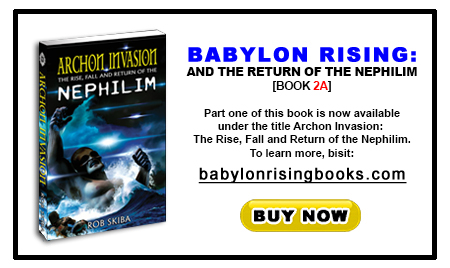


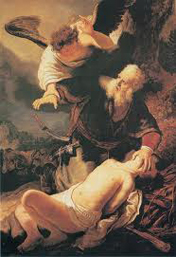

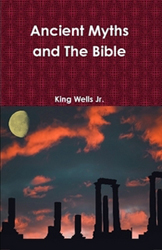 King Wells, the author of
King Wells, the author of 

